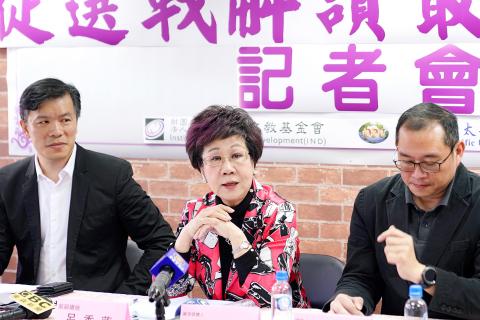Taiwan should become a permanently neutral nation as an alternative to either unification with China or independence, former vice president Annette Lu (呂秀蓮) said yesterday.
Chinese President Xi Jinping (習近平) on Wednesday in a speech said that Taiwan “must and will be” united with China based on the so-called “1992 consensus” and in accordance with the “one China” principle, and proposed a Taiwanese version of the “one country, two systems” model.
Lu, who left the Democratic Progressive Party (DPP) last year, said that there is no longer a “1992 consensus,” but only “one China, two systems (一中兩制).”

Photo: Huang Hsin-po, Taipei Times
The “1992 consensus,” a term former Mainland Affairs Council chairman Su Chi (蘇起) in 2006 admitted making up in 2000, refers to a tacit understanding between the Chinese Nationalist Party (KMT) and the Chinese government that both sides of the Strait acknowledge there is “one China,” with each side having its own interpretation of what “China” means.
Xi said he would not rule out the use of force, so the option of peaceful unification is also off the table, Lu said, adding that by the same token, maintaining the “status quo” is likely impossible and a new approach is needed.
Taiwan could only take three paths, she said.
First, it could accept China’s “one China, two systems,” in which China is the People’s Republic of China (PRC), she said.
Second, the nation could push for formal independence, whether as the Republic of China or as Taiwan, she said.
The third path is to become a permanently neutral nation, Lu said.
She said she would officially launch a referendum proposal on Feb. 27 to make Taiwan permanently neutral and would travel to the US in March to promote the idea.
Separately, on Saturday, Hong Kong democracy advocate Leung Kwok-hung (梁國雄) said that Hong Kongers’ rights have diminished since the adaption of “one country, two systems.”
Toward the end of 1984, China and the UK signed the Sino-British Joint Declaration on the question of Hong Kong, with annexes promising that Hong Kong would remain autonomous for 50 years, he said.
In 1990, the Chinese National People’s Congress (NPC) passed the Basic Law of the Hong Kong Special Administrative Region, the territory’s miniconstitution, he said.
However, the promises made to Hong Kongers in both documents have never been fulfilled, he said, adding that the situation has deteriorated instead.
To the Chinese Communist Party (CCP), “one country, two systems” means implementing two systems within one country, but the CCP’s sovereignty over Hong Kong is absolute and Hong Kong was never given the “high degree of autonomy” mandated by the Basic Law, he said.
In 2007, the NPC agreed that the chief executive of Hong Kong would be elected by universal suffrage in 2017, but in 2014, it rejected universal suffrage, he said.
The articles in the Basic Law that protect the public’s rights are constantly being amended, he added.
The right to interpret the Basic Law belongs to the NPC Standing Committee and its interpretation of the law can overturn the interpretation of the Hong Kong Court of Final Appeal, he said.
Hong Kong’s rule of law has become the rule of man, he said, urging Taiwan not to accept a “one country, two systems” arrangement.

The manufacture of the remaining 28 M1A2T Abrams tanks Taiwan purchased from the US has recently been completed, and they are expected to be delivered within the next one to two months, a source said yesterday. The Ministry of National Defense is arranging cargo ships to transport the tanks to Taiwan as soon as possible, said the source, who is familiar with the matter. The estimated arrival time ranges from late this month to early next month, the source said. The 28 Abrams tanks make up the third and final batch of a total of 108 tanks, valued at about NT$40.5 billion

Travel agencies in Taiwan are working to secure alternative flights for travelers bound for New Zealand for the Lunar New Year holiday, as Air New Zealand workers are set to strike next week. The airline said that it has confirmed that the planned industrial action by its international wide-body cabin crew would go ahead on Thursday and Friday next week. While the Auckland-based carrier pledged to take reasonable measures to mitigate the impact of the workers’ strike, an Air New Zealand flight arriving at Taipei from Auckland on Thursday and another flight departing from Taipei for Auckland on Saturday would have to

A group from the Taiwanese Designers in Australia association yesterday represented Taiwan at the Midsumma Pride March in Melbourne. The march, held in the St. Kilda suburb, is the city’s largest LGBTQIA+ parade and the flagship event of the annual Midsumma Festival. It attracted more than 45,000 spectators who supported the 400 groups and 10,000 marchers that participated this year, the association said. Taiwanese Designers said they organized a team to march for Taiwan this year, joining politicians, government agencies, professionals and community organizations in showing support for LGBTQIA+ people and diverse communities. As the first country in Asia to legalize same-sex

MOTIVES QUESTIONED The PLA considers Xi’s policies toward Taiwan to be driven by personal considerations rather than military assessment, the Epoch Times reports Chinese President Xi Jinping’s (習近平) latest purge of the Chinese People’s Liberation Army (PLA) leadership might have been prompted by the military’s opposition to plans of invading Taiwan, the Epoch Times said. The Chinese military opposes waging war against Taiwan by a large consensus, putting it at odds with Xi’s vision, the Falun Gong-affiliated daily said in a report on Thursday, citing anonymous sources with insight into the PLA’s inner workings. The opposition is not the opinion of a few generals, but a widely shared view among the PLA cadre, the Epoch Times cited them as saying. “Chinese forces know full well that